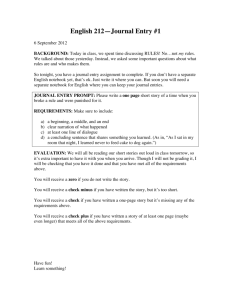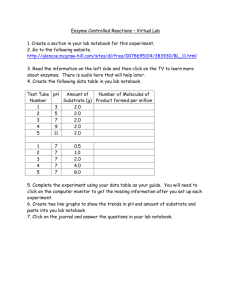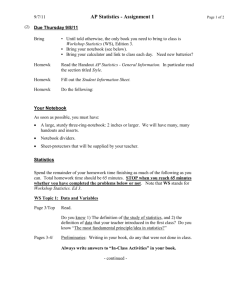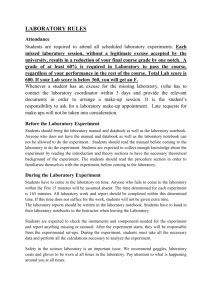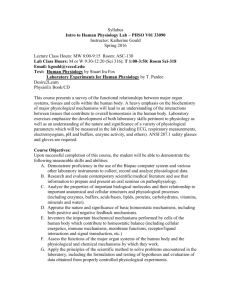Physiology Laboratory
advertisement
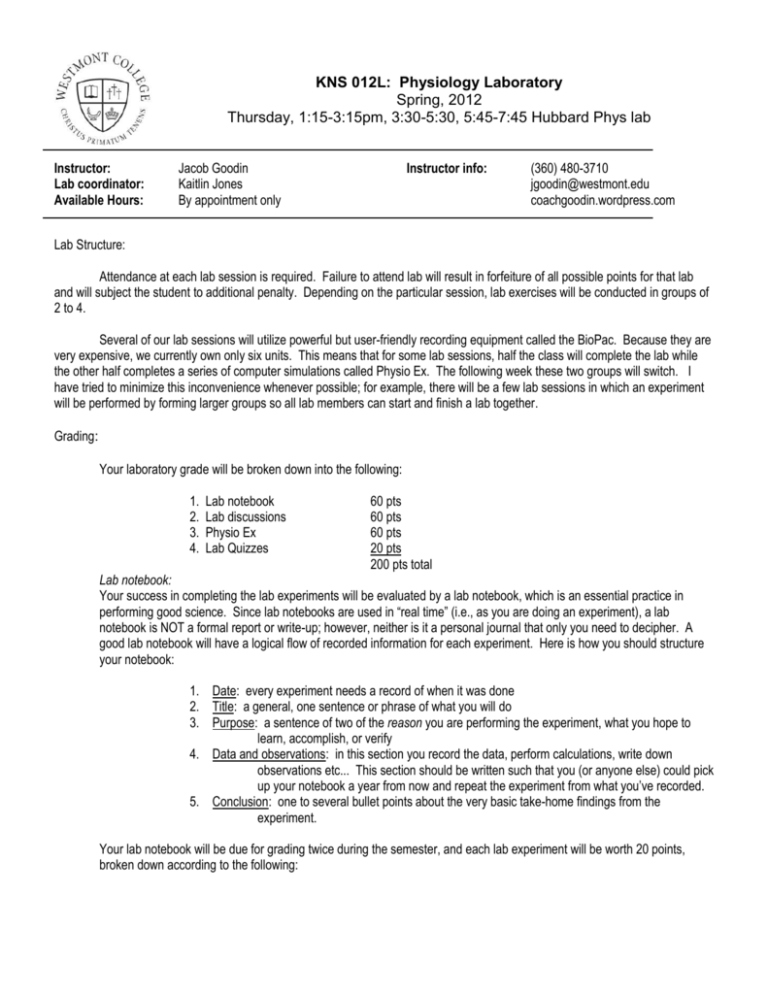
KNS 012L: Physiology Laboratory Spring, 2012 Thursday, 1:15-3:15pm, 3:30-5:30, 5:45-7:45 Hubbard Phys lab Instructor: Lab coordinator: Available Hours: Jacob Goodin Kaitlin Jones By appointment only Instructor info: (360) 480-3710 jgoodin@westmont.edu coachgoodin.wordpress.com Lab Structure: Attendance at each lab session is required. Failure to attend lab will result in forfeiture of all possible points for that lab and will subject the student to additional penalty. Depending on the particular session, lab exercises will be conducted in groups of 2 to 4. Several of our lab sessions will utilize powerful but user-friendly recording equipment called the BioPac. Because they are very expensive, we currently own only six units. This means that for some lab sessions, half the class will complete the lab while the other half completes a series of computer simulations called Physio Ex. The following week these two groups will switch. I have tried to minimize this inconvenience whenever possible; for example, there will be a few lab sessions in which an experiment will be performed by forming larger groups so all lab members can start and finish a lab together. Grading: Your laboratory grade will be broken down into the following: 1. 2. 3. 4. Lab notebook Lab discussions Physio Ex Lab Quizzes 60 pts 60 pts 60 pts 20 pts 200 pts total Lab notebook: Your success in completing the lab experiments will be evaluated by a lab notebook, which is an essential practice in performing good science. Since lab notebooks are used in “real time” (i.e., as you are doing an experiment), a lab notebook is NOT a formal report or write-up; however, neither is it a personal journal that only you need to decipher. A good lab notebook will have a logical flow of recorded information for each experiment. Here is how you should structure your notebook: 1. Date: every experiment needs a record of when it was done 2. Title: a general, one sentence or phrase of what you will do 3. Purpose: a sentence of two of the reason you are performing the experiment, what you hope to learn, accomplish, or verify 4. Data and observations: in this section you record the data, perform calculations, write down observations etc... This section should be written such that you (or anyone else) could pick up your notebook a year from now and repeat the experiment from what you’ve recorded. 5. Conclusion: one to several bullet points about the very basic take-home findings from the experiment. Your lab notebook will be due for grading twice during the semester, and each lab experiment will be worth 20 points, broken down according to the following: 1. 10 points for the above format followed properly and completely—2 points for each section. 2. 10 points for a 1 to 2 page TYPED Discussion section, for each experiment, discussing the significance of your data – did your data conform to the expected results (i.e., your hypothesis)? If not, why do you think so? Did things go awry? Were your data not easy to interpret? Here, you would also make suggestions for future experiments: is there a logical next course of questions to ask? For each experiment, several questions are asked with regard to data interpretation and meaning. As a rule of thumb, you can use these questions as the basis for forming your discussion. The temptation with this grading scheme might be to wait until soon before the notebooks are due to record several labs. You are strongly encouraged not to do this! The due dates will be at the end of lab week 8 and for the second time a week after the last lab. Please note: late notebooks will be assessed a daily 10 point-deduction penalty. I am happy to provide any encouragement or direction to help you develop good lab notebook skills. Quizzes: Two short quizzes worth 10 points each will be given at random during the semester, at the beginning of a lab session. These quizzes are designed such that you should receive full credit if you have kept pace with the lab exercises. Wk 1 2 3 4 5 6 7 8 9 10 11 12 13 14 15 16 Date Lab 1/7 1/14 1 1 2/4 2/11 2 2 1 3/4 3 4 3/25 5 5 4/15 4/22 Reflex Response/Neurophysiology Reflex Response/Neurophysiology Evaluate data from Reaction Time lab Ntbks ECG and Blood Pressure Hematocrit, Hemoglobin, and Blood Cells Respiration Spirometry/Respiratory System Mechanics Respiration Spirometry/Respiratory System Mechanics Easter Recess 4/1 4/8 Reaction Time/Cell Transport Spring Recess 3/11 3/18 Reaction Time/Cell Transport Four Day 2/18 2/25 Due Martin Luther King Holiday 1/21 1/28 Lab exercise 6 6 Kidney Function/Renal System Physiology Kidney Function/Renal System Physiology You made it! Ntbks

